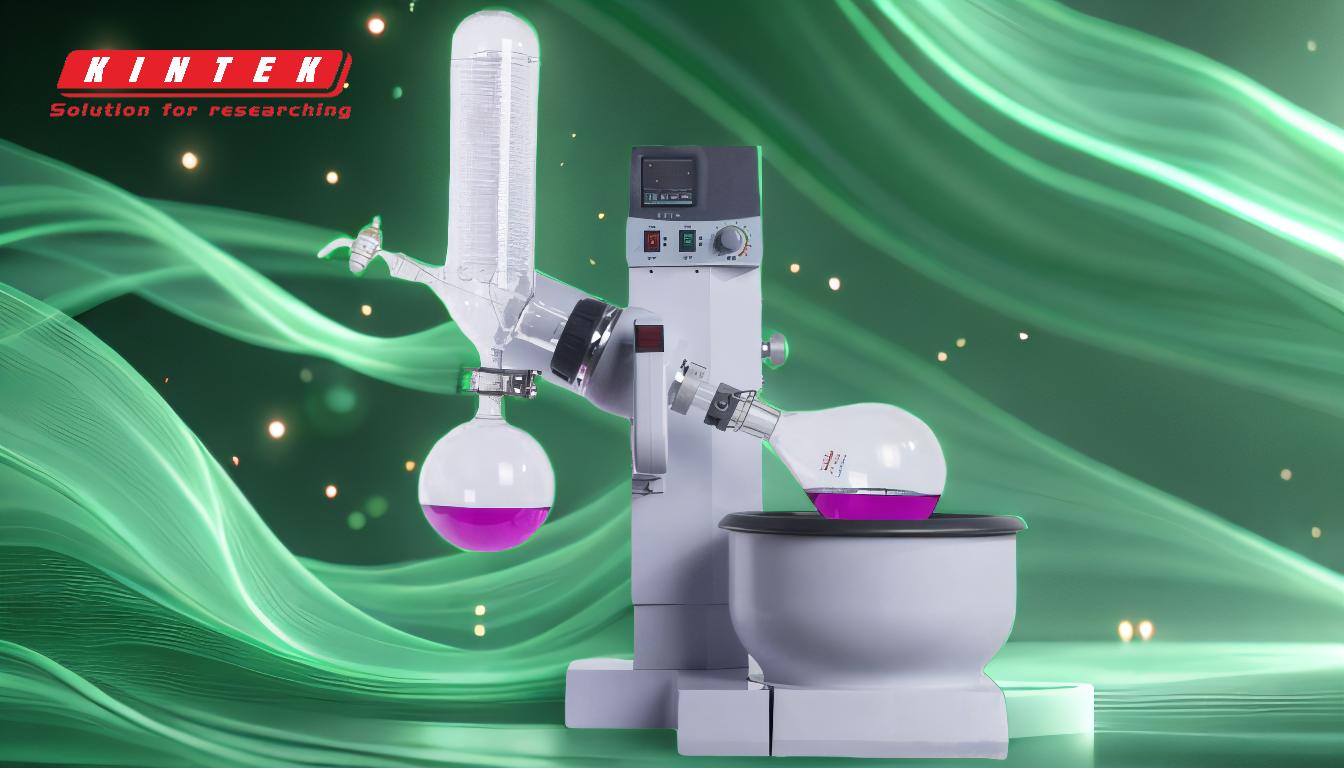A rotary evaporator is a versatile laboratory instrument primarily used for the efficient and gentle removal of solvents from samples through evaporation under reduced pressure. It is widely employed in industries such as pharmaceuticals, biotechnology, chemistry, and food science for tasks like concentration, crystallization, drying, separation, and solvent recovery. Its ability to operate at lower temperatures makes it ideal for handling heat-sensitive materials, such as biological products or volatile compounds. Additionally, rotary evaporators are used in molecular gastronomy and teaching laboratories for innovative applications like non-heat evaporation and solvent extraction.
Key Points Explained:

-
Primary Function: Solvent Removal
- A rotary evaporator is designed to remove volatile solvents from liquid mixtures efficiently. This is achieved by lowering the pressure, which reduces the boiling point of the solvent, and rotating the sample to increase the surface area for faster evaporation.
- Applications include:
- Extracting solvents from chemical reactions.
- Purifying plant extracts and essential oils.
- Recovering solvents for reuse in industrial processes.
-
Applications in Various Industries
-
Pharmaceutical and Biopharmaceutical Industries:
- Used for concentrating and purifying heat-sensitive biological products, such as proteins or enzymes, without causing degradation.
- Essential for solvent recovery in drug formulation and purification processes.
-
Chemical Industry:
- Employed for distillation, separation, and purification of complex mixtures.
- Ideal for handling low-boiling-point organic solvents.
-
Food and Molecular Gastronomy:
- Used to extract water from juices or concentrate flavors without losing volatile aromatic compounds.
- Enables non-heat evaporation techniques to preserve delicate flavors in molecular cooking.
-
Pharmaceutical and Biopharmaceutical Industries:
-
Key Processes Enabled by Rotary Evaporators
-
Concentration:
- Reducing the volume of a solution by evaporating the solvent, leaving behind a concentrated sample.
-
Crystallization:
- Facilitating the formation of crystals by slowly evaporating the solvent from a saturated solution.
-
Drying:
- Removing residual solvents from solid or semi-solid samples.
-
Separation:
- Isolating components of a mixture based on differences in volatility.
-
Solvent Recovery:
- Collecting and reusing solvents, which is cost-effective and environmentally friendly.
-
Concentration:
-
Advantages of Rotary Evaporators
-
Gentle Evaporation:
- Operates at lower temperatures due to reduced pressure, making it suitable for heat-sensitive materials.
-
Efficiency:
- The rotating flask increases the surface area, speeding up evaporation.
-
Versatility:
- Can handle a wide range of solvents and sample types.
-
Precision:
- Allows controlled evaporation rates, ensuring consistent results.
-
Gentle Evaporation:
-
Specific Use Cases
-
Laboratory Research:
- Used in chemical engineering, medical research, and biological studies for sample preparation and purification.
-
Industrial Applications:
- Extracting CBD from hemp or other industrial compounds.
- Purifying petrochemical products in the oil and gas industry.
-
Teaching and Training:
- Demonstrates principles of evaporation, distillation, and solvent recovery in educational settings.
-
Laboratory Research:
-
Unique Applications
-
Molecular Gastronomy:
- Used to create innovative culinary techniques, such as extracting and concentrating flavors without heat.
-
Chromatography:
- Prepares samples for analysis by removing solvents and concentrating analytes.
-
Molecular Gastronomy:
In summary, a rotary evaporator is an indispensable tool in laboratories and industries for solvent removal, purification, and concentration. Its ability to operate under reduced pressure and at lower temperatures makes it ideal for handling delicate materials, while its versatility and efficiency make it suitable for a wide range of applications, from pharmaceuticals to molecular gastronomy.
Summary Table:
| Key Features | Applications |
|---|---|
| Gentle Evaporation | Ideal for heat-sensitive materials like proteins and volatile compounds. |
| Efficiency | Rotating flask increases surface area for faster evaporation. |
| Versatility | Handles a wide range of solvents and sample types. |
| Precision | Controlled evaporation rates ensure consistent results. |
| Industries | Pharmaceuticals, biotechnology, chemistry, food science, and molecular gastronomy. |
| Key Processes | Concentration, crystallization, drying, separation, and solvent recovery. |
Enhance your lab's efficiency with a rotary evaporator—contact us today to learn more!










